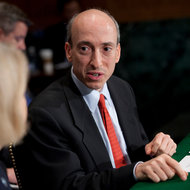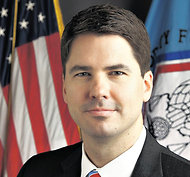 Andrew Harrer/Bloomberg NewsGary Gensler, chairman of the Commodity Futures Trading Commission, has imposed checks on derivatives trading.
Andrew Harrer/Bloomberg NewsGary Gensler, chairman of the Commodity Futures Trading Commission, has imposed checks on derivatives trading.
Four years after Wall Street teetered on the brink of collapse, regulators are struggling to rein in foreign risk-taking that imperils American banks.
On Thursday, a member of the Commodity Futures Trading Commission, which regulates the $700 trillion derivatives business, outlined the risks that remain. In a speech to the International Swaps and Derivatives Association, a financial industry trade group, the commissioner, Mark Wetjen, highlighted “the very real danger that risks undertaken abroad can seriously impact the health of financial institutions, and the broader economy, here at home.”
Although the agency has imposed checks on derivatives trading in the United States, just how to crack down on foreign trading is still being debated.
In June, the agency took a first step, introducing a plan to oversee Wall Street banks that ship derivatives trading overseas. The agency’s draft proposal, stemming from the Dodd-Frank financial regulatory law, would apply new derivatives rules to American banks that have foreign units and foreign banks that conduct significant trading in the United States.
Mr. Wetjen, a Democratic commissioner at the C.F.T.C., highlighted the agency’s plan to rein in overseas derivatives trading. But in the speech, delivered on the eve of the four-year anniversary of Lehman Brothers‘ demise, he also sounded a note of skepticism on certain details.
 Commodity Futures Trading CommissionMark P. Wetjen of the Commodity Futures Trading Commission.
Commodity Futures Trading CommissionMark P. Wetjen of the Commodity Futures Trading Commission.
“I continue to have concerns, however, about the clarity, scope, and workability of the proposals in certain areas,” he said.
Gary Gensler, the agency’s Democratic chairman and the architect of the plan, has cited the recent multibillion-dollar trading loss at JPMorgan Chase as a “stark reminder” of how overseas trading can reverberate in the United States.
But the plan is far from a done deal. The agency has spent weeks hashing out internal disputes, and a final decision is not expected until later this year.
Mr. Wetjen is playing a crucial role in the negotiations. A former aide to Harry Reid, the Senate majority leader, he is the newest member of the five-person commission leadership. Mr. Wetjen has sided with his fellow Democrats on every Dodd-Frank rule while positioning himself as a more independent voice from Mr. Gensler.
When the agency was readying the cross-border proposal in June, Mr. Wetjen pushed for more flexibility. He also suggested that the financial industry have additional time to comply.
He reiterated some concerns on Thursday, saying the agency may not have provided sufficient “clarity” about the timing and scope of the plan. “The commission must do better,” he said.
Mr. Wetjen, who has called for the agency to complete the plan as “interpretive guidance” rather than a formal rule-making, also advocated so-called substituted compliance. Under such a plan, banks based overseas can seek an exemption if they face similar rules from foreign regulators.
“In light of the commission’s limited resources, efficient regulation through deference to comparable regulation just makes sense,” he said.
Despite his concerns, Mr. Wetjen underscored his support for the the broader regulatory overhaul, noting that his speech came nearly four years to the day that firms like the American International Group nearly collapsed. Foreign derivatives contracts written by A.I.G., the giant insurance company, which received a $182 billion federal lifeline, brought American firms to their knees.
“Regulation will not prevent every risk from materializing at a financial firm in any given jurisdiction,” he said, while adding that “we must do what we can to prevent such risks from damaging our economy.”
Article source: http://dealbook.nytimes.com/2012/09/13/4-years-after-lehmans-demise-regulators-debate-overhaul/?partner=rss&emc=rss

